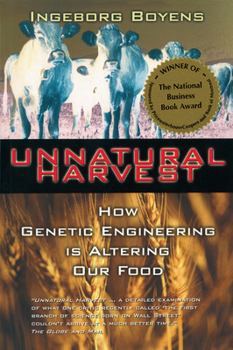Unnatural Harvest: How Genetic Engineering Is Altering Our Food
Do you know what you're eating? Do you know what you're feeding your children? Chances are, the last time you visited the grocery store, you unwittingly purchased foodstuffs that have been genetically... This description may be from another edition of this product.
Format:Paperback
Language:English
ISBN:0385257899
ISBN13:9780385257893
Release Date:February 2000
Publisher:Doubleday Canada
Length:296 Pages
Weight:2.05 lbs.
Dimensions:0.8" x 5.6" x 8.3"
Customer Reviews
2 ratings
excellent book
Published by Thriftbooks.com User , 23 years ago
This book is about genetically engineered foods. It also talks about related areas a bit, such as the mad-cow disease problem and hormone enriched cattle in support of its basic thesis: Big corporations are pushing for the use and acceptance of genetically modified crops without taking sufficient care to assure safety for people and the environment as a whole.I think it is a fair-minded book. Even though I think the position of the book is basically that profit is the main motive for big companies like Monsanto to provide genetically engineered crops and that this poses long-term dangers for the sake of short term financial gain, the benefits of genetic engineering are also explored, for example in areas like the production of medecine and the creation of enriched and hardier crops for the 3rd world. I some places the arguments get a bit confusing. For example, I don't understand why the use of genetically engineered crops in North America is condemmed, but also the lack of widespread use of GMO crops in the 3rd world is decried (vis. the big companies are more interested in profit than helping the 3rd world to have anough food). It is really hard for people like me, who live in an urban setting and don't have any agricultural background, to understand food. For me, food has become a cheap commodity that I don't think about much. It comes off a supermarket shelf looking clean and shiny -- that is if its not in a can or takeout. I, and most other people in our western society, am disconnected from the complex process whereby food is produced, and I guess GMO's add yet another layer of complexity which makes it hard to understand what is going on. However, I think it is important for people to learn more about these issues, because ultimately almost nothing is more important to our future well-being.
A Bookclub Choice.....
Published by Thriftbooks.com User , 23 years ago
Since this probably wouldn't be a book I'd personally reach for, I'm very glad it was a choice from a book club member! It introduced me to a topic we should all be more aware of.....biotechnology that affects our food, our environment; plants and animals, and it was written for me; an 'unscientific' reader, in a format easily read and understood. Big farms, or Agribusiness, is here to stay....and since I came from a prairie wheat farm, and can remember how wonderful the 'new' Durham wheat was for our cold Cdn. climate, I can understand the farmer's plight..."We need improved species, but at what cost?" Or as a great statesman and educator, who brought the University to the farm, Alberta's Dr. Grant MacEwan, was famous for asking, "In our search for the good life, will we leave our vineyard better or worse?" Ingeborg Boyens may not have a science degree, but she has done a remakably thorough research job in bringing us well documented information, giving us the good and the bad. My copy is well marked; corners turned to quotes from famous leaders in this area, or specific information I'd like to recall, easily. I learned so much; so many facts...but, most of all I am now very much aware of things that will affect me, my family; my grandchildren, and the future of our small 'green' planet. This is a book that will keep the dialogue in Canada, and elsewhere, continue to keep Big Governments and Big Businesses on their toes, so we can all benefit from biodiversity. I think especially of the 3rd world countries I've visited when trying to bring a working democracy to their fragile societies. If biotechnology can give them better foods; easier and cheaper, their economies and their futures will be more hopeful. Not a quick read, but a timely and well appreciated one!





